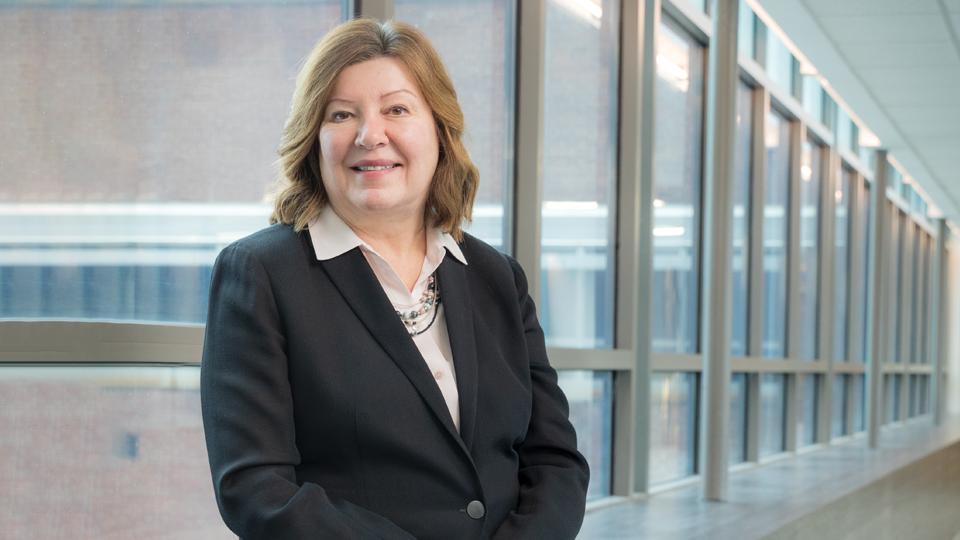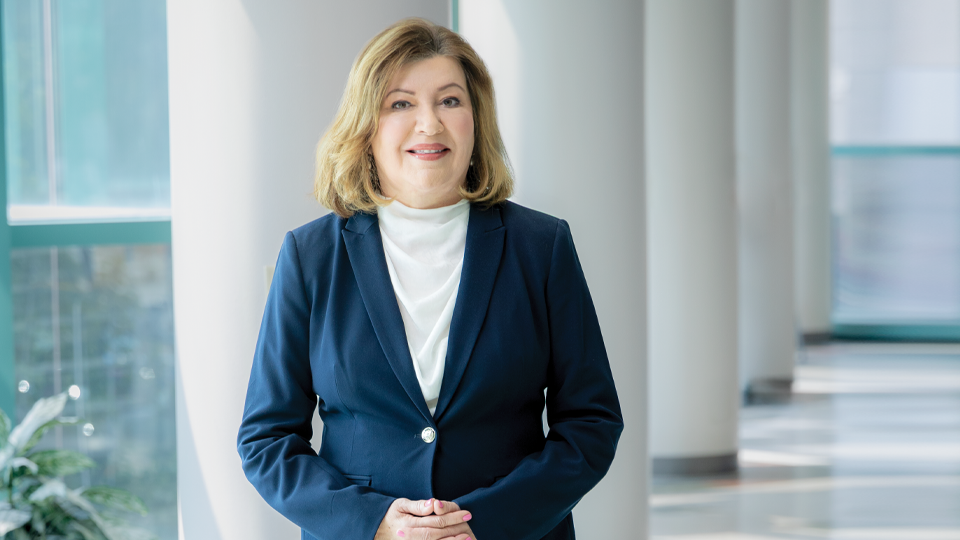
After 10 years as MATC's president, Dr. Vicki J. Martin is retiring, leaving a legacy of innovation, improved access and student success
As a child, MATC President Dr. Vicki J. Martin never dreamed she'd go to college. No one in her family ever had.
Dr. Martin expected to follow in her mother's footsteps and become a secretary, but she admitted that she "wasn't very good at secretarial work."
Destiny had other plans for her.
Four degrees and a lifelong career in academia later, Dr. Martin is now preparing to retire in June, having initiated a myriad of programs to improve student success, increase access to college and ensure a talent pipeline for area employers.
Finding her own path
Dr. Martin discovered another way forward during an internship in high school.
"My employers at my secretarial internship saw that the work wasn't right for me," Dr. Martin said. They took her to visit the University of Wisconsin-LaCrosse and encouraged her to enroll. She surprised her parents by deciding to go to college.
I like being a pioneer. It helps me be bolder and more courageous.
Her studies led to a career in higher education. After earning a master's degree in counseling and guidance, Dr. Martin worked with students at the University of Wisconsin-Milwaukee and the Carroll College-Columbia Hospital nursing program. In 1988, she landed a job as director of registration and student services at MATC's Oak Creek Campus.
Dr. Martin was immediately struck by the challenges prospective MATC students faced. She saw them struggle to balance education, parenting and jobs. Many dealt with low test scores and poor high school grades. "As I worked with them, I saw them grow and succeed because MATC has the support systems and small classes that help students flourish," she said. "I knew I was in the right place." She spent the rest of her career at MATC.
She earned a second master's degree and a doctorate, and she was promoted to team leader and then vice president of the Oak Creek Campus. Over the years, Dr. Martin also held collegewide positions, including continuous quality improvement and strategic planning director, provost and executive vice president, and interim president. In 2014, she was appointed MATC president.
Dr. Martin is known for launching initiatives that promote student success and access to college, encouraging her team to move quickly.
Being first in her family to attend college had an impact on her leadership style, she said. "I like being first. I like being a pioneer. It helps me be bolder and more courageous. When we have ideas for new programs, I believe we can figure it out as we go if we have enough staff to build momentum. That helps when we try things others might not have tried."
Perhaps no MATC initiative has gained more attention and accolades than the launch of the MATC Promise for New High School Graduates — the first Promise program in Wisconsin. MATC offered young people who met the criteria the chance to attend the college tuition-free. Similar programs had been offered in other states, but what set MATC's program apart was the fact that tuition gaps not met by financial aid are covered by donor gifts rather than tax dollars.
Several years later, MATC launched the Promise for Adults, one of the first such programs in the nation, to help students who started but did not complete college. The college also created the ReStart and Reconnect programs, which help students unable to finish college due to student debt.

Under Dr. Martin's leadership, MATC was the first college in Wisconsin and on of only a small number nationwide to join the Second Chance Pell program, which helps incarcerated individuals access college education. Other initiatives she launched include MATC Drive and the AI Hurvis/PEAK Transportation Center, which expand access to automotive and transportation programs for students in underserved areas; the Ellen & Joe Checota MATC Scholarship Program, which funds full scholarships for students in short-term training programs; and major gifts from United Health Foundation and Froedtert Hospital to help healthcare students.
Dr. Martin also led MATC to adapt the nationally recognized Guided Pathways framework, which required a major restructuring of the college to improve student success and retention. To build on that foundation, Dr. Martin helped create the first cohort to join the Moon Shot for Equity, which strives to eliminate equity gaps by 2030. She also was a charter member of the M3 (pronounced M-cubed) partnership with UWM and Milwaukee Public Schools, which strengthens pathways and student engagement across the entities. She also oversaw the development of the Westown Green student apartments, which address housing insecurity and offer students a residential experience near the Downtown Milwaukee Campus; the Student Resource Center; and food pantries at all four campuses and the MATC Education Center at Walker's Square.
Students first
"My personal mission remained the same throughout my time at MATC," Dr. Martin said. "I always have students and their success in mind."
Dr. Martin said the biggest challenge in her time as president was dealing with the COVID-19 pandemic, which closed the college's physical doors and forced instructors and students into online instruction nearly overnight. She is particularly proud of keeping workers employed and helping the college to return students safely to campus to participate in studies that required hands-on learning.
Dealing with the response to the tragic death of George Floyd in police custody in May 2020 also was a major challenge, she said. "It was particularly difficult because it happened during the pandemic when we were not here in person to work through our feelings together." As the college and the nation reckoned with racial injustice, MATC launched its first Diversity, Equity and Inclusion Plan, overcoming the physical distance imposed by the pandemic.
She believes the biggest challenges facing the college in the future are working to grow enrollment and the need to increase funding, especially for community education programs like GED/HSED and English as a Second Language. Artificial intelligence is another major challenge and opportunity, Dr. Martin said. "AI is changing the way we work and forcing us to examine how we are teaching and how we can be more productive."
Looking toward retirement on June 30, 2024, Dr. Martin said she would like to take courses, serve on boards, consult, travel, continue her artwork and spend time with family.
"I will really miss the graduations, pinning ceremonies and seeing students in the halls and knowing we are helping them," Dr. Martin said. "I will miss dreaming of and doing new things to help students."
She is satisfied with her accomplishments. "I've started everything I wanted to start," she said. "Now it's up to the next president to decide if they want to continue to grow those programs or go down different paths. I gave the best 35 years of my career to MATC. It's time for someone else to take it to the next level. I'm so grateful to have served as the 10th president of MATC for 10 years."

